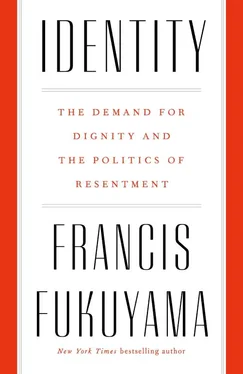In the United States, an assimilation agenda begins with public education. The teaching of basic civics has been in long-term decline in the United States, not just for immigrants but for native-born Americans, and this needs to be reversed. Like Europe, the United States too has policies that impede assimilation, such as the thirteen or so different languages taught in the New York City public school system. Bi- and multilingual programs have been marketed as ways of speeding the acquisition of the English language by nonnative speakers. But it has developed a constituency of its own, with the educational bureaucracy defending its prerogatives regardless of actual outcomes for English acquisition. {7}
Assimilation of immigrants may require even more active measures. In recent decades, courts in the United States and other developed democracies have gradually eroded the distinction between citizen and noncitizen. {8} Noncitizens rightfully enjoy many legal rights, including rights to due process, speech, association, free exercise of religion, and a range of state services such as education. Noncitizens also share duties with citizens: they are expected to obey the law and must pay taxes, though only citizens are liable for jury duty in the United States. The distinction between noncitizens who are documented and those who are not is sharper, since the latter are liable to deportation, but even the undocumented possess due process rights. The only major right that is conveyed solely by citizenship is the right to vote; in addition, citizens can enter and exit the country freely and can expect support from their government when traveling abroad.
Small as they are, it is important to hold on to these distinctions. Basic human rights are universal, but full enjoyment of rights actively enforced by state power is a reward for membership in a national community and acceptance of that community’s rules. The right to vote is particularly important, since it gives individuals a share of state power. As a human being, I may have an abstract right to citizenship and political representation, but as an American citizen I would not expect to be able to vote in Italy or in Ghana, even if I lived in one of those countries.
Contemporary liberal democracies do not demand a lot in return for state protection of their citizens’ rights, and in particular the right to vote. The sense of national community might be strengthened by a universal requirement for national service. Such a mandate would underline the fact that citizenship requires commitment and sacrifice to maintain. One could do it by serving either in the military or in a civilian capacity. This requirement is actually articulated in the American naturalization oath, which enjoins willingness to bear arms on behalf of the country, or to work in a civilian service as required by law. If such service was correctly structured, it would force young people to work together with others from very different social classes, regions, races, and ethnicities, just as military service does today. And like all forms of shared sacrifice, it would be a powerful way of integrating newcomers into the national culture. National service would be a contemporary form of classical republicanism, a form of democracy that encouraged virtue and public-spiritedness rather than simply leaving citizens alone to pursue their private lives.
A policy focus on assimilation also means that levels of immigration and rates of change become important, for both Europe and the United States. Assimilation into a dominant culture becomes much harder as the numbers of immigrants rise relative to the native population. As immigrant communities reach a certain scale, they tend to become self-sufficient and no longer need connections to the groups outside themselves. They can overwhelm public services and strain the capacity of schools and other public institutions to care for them. While immigrants will likely have a positive net effect on public finance in the long run, this will happen only if they get jobs and become taxpaying citizens or legal resident aliens. Large numbers of newcomers can also weaken support for generous welfare benefits on the part of native-born citizens, a factor in both the European and the American immigration debates.
Liberal democracies benefit greatly from immigration, both economically and culturally. But they also unquestionably have the right to control their own borders. A democratic political system is based on a contract between government and citizen in which both have obligations. Such a contract makes no sense without delimitation of citizenship and exercise of the franchise. All people have a basic human right to citizenship, something that, according to the Universal Declaration of Human Rights, cannot be arbitrarily taken away from them. But that does not mean they have the right to citizenship in any particular country. International law does not, moreover, challenge the right of states to control their borders, or to set criteria for citizenship. {9} What refugees are owed is sympathy, compassion, and support. Like all moral obligations, however, these obligations need to be tempered by practical considerations of scarce resources, competing priorities, and the political sustainability of a program of support.
For Europe, this implies that the EU as a whole needs to be able to control its external borders better than it does, which in practice means giving countries such as Italy and Greece both material help and stronger authority to regulate the flow of migrants into Europe. The organization charged with doing this, Frontex, is understaffed, underfunded, and lacks strong political support from the very member states most concerned with keeping migrants out. The Schengen system of free internal movement will not be politically sustainable unless the problem of Europe’s outer borders is somehow solved.
The situation in the United States is somewhat different. The country has been very inconsistent in the enforcement of its immigration laws over the years. This enforcement is not impossible, but is a matter of political will. While levels of deportations began rising under the Obama administration, the often arbitrary nature of these actions does not make for a sustainable long-term policy. Enforcement does not require a border wall; a huge proportion of undocumented aliens have entered the country legally but have remained on expired visas. Rather, the rules could be better enforced through a system of employer sanctions, which requires a national identification system that will tell employers who is legitimately in the country. This has not happened because too many employers benefit from the cheap labor that immigrants provide and do not want to act as enforcement agents. It has also not come about because of a uniquely American opposition to a national ID system, based on a suspicion of government shared by left and right alike.
As a result, the United States now hosts a population of some 11–12 million undocumented aliens. The vast majority of these people have been in the country for years and are doing useful work, raising families, and otherwise behaving as law-abiding citizens. The idea that they are all criminals because they violated U.S. law to enter the country is ridiculous, though some within this population are criminals, just as within the native-born population. It is also ridiculous to think that the United States could ever force all these people to leave the country and return to their countries of origin. A project on that scale would be worthy of Stalin’s Soviet Union or Nazi Germany.
So the possibility of a basic bargain on immigration reform has existed for some time. In a trade, the government would undertake serious enforcement measures to control its borders, in return for an agreement to give undocumented aliens without criminal records a path toward citizenship. {10} This bargain might actually receive majority support among the American public, but hard-core immigration opponents are dead set against any form of “amnesty,” and pro-immigrant groups are opposed to stricter enforcement of existing rules. The polarization and dysfunction of the American political system has made this bargain unachievable for many years. I have elsewhere labeled instances of this sort American vetocracy, by which minority views can easily block majority consensus. {11}
Читать дальше












